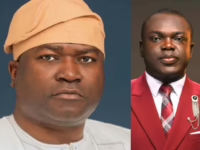The Federal High Court has rejected a legal claim filed by businessman Abubakar Isa Funtua, who sought to recover 43 million shares he contended were transferred without his approval to Emerging Markets Telecommunication Services Limited (EMTS), the company behind 9mobile.
Justice Mohammed Umar dismissed the case on the grounds that the plaintiff lacked the necessary legal standing and that the suit constituted an abuse of the judicial process.
In the lawsuit, Funtua named several defendants, including Seltrix Limited, Hayatu Hassan Hadejia, Teleology Nigeria Limited, Mohammed Edewor, EMTS, the Corporate Affairs Commission (CAC), the Nigerian Communications Commission (NCC), LH Telecommunication Limited, and General Theophilus Yakubu Danjuma.
Among the eleven reliefs sought, Funtua requested a formal declaration affirming his status as the rightful beneficial owner of the contested shares, which he claimed were held in trust by Seltrix Ltd on behalf of Teleology Nigeria Ltd.
However, on February 5, 2025, five of the defendants jointly filed a preliminary objection, urging the court to dismiss the suit due to lack of jurisdiction and abuse of court process.
After reviewing the submissions, Justice Umar upheld the defendants’ objection, emphasizing that the plaintiff failed to establish any legal interest in the shares in question.
The judge noted, “A thorough examination of the evidence revealed no proof supporting the plaintiff’s claims. There was no indication that the 43 million ordinary shares were held in trust for the plaintiff by the first defendant. Additionally, the second defendant denied any business dealings with the plaintiff, and these denials went unchallenged.”
Justice Umar further explained that the documents presented by Funtua did not demonstrate the existence of a trust relationship that would grant him standing to sue. The plaintiff’s claims were not sufficiently connected to the evidence submitted.
The court also highlighted that the plaintiff failed to substantiate the facts he alleged or link them convincingly to the exhibits provided.
In his ruling, Justice Umar stated, “The defendants’ objections effectively refuted the plaintiff’s arguments. Since the plaintiff lacks legal standing, the court is precluded from considering other issues raised.”
He added that because Funtua was found to lack the capacity to initiate the lawsuit, the court saw no need to address additional objections, including claims that the suit was time-barred, procedurally flawed, and that the plaintiff was an unwarranted interloper attempting to interfere with EMTS’s business operations.
“Consequently, I hereby order the dismissal of this case on the basis of the plaintiff’s lack of standing. This is the ruling of the court,” the judge concluded.
























